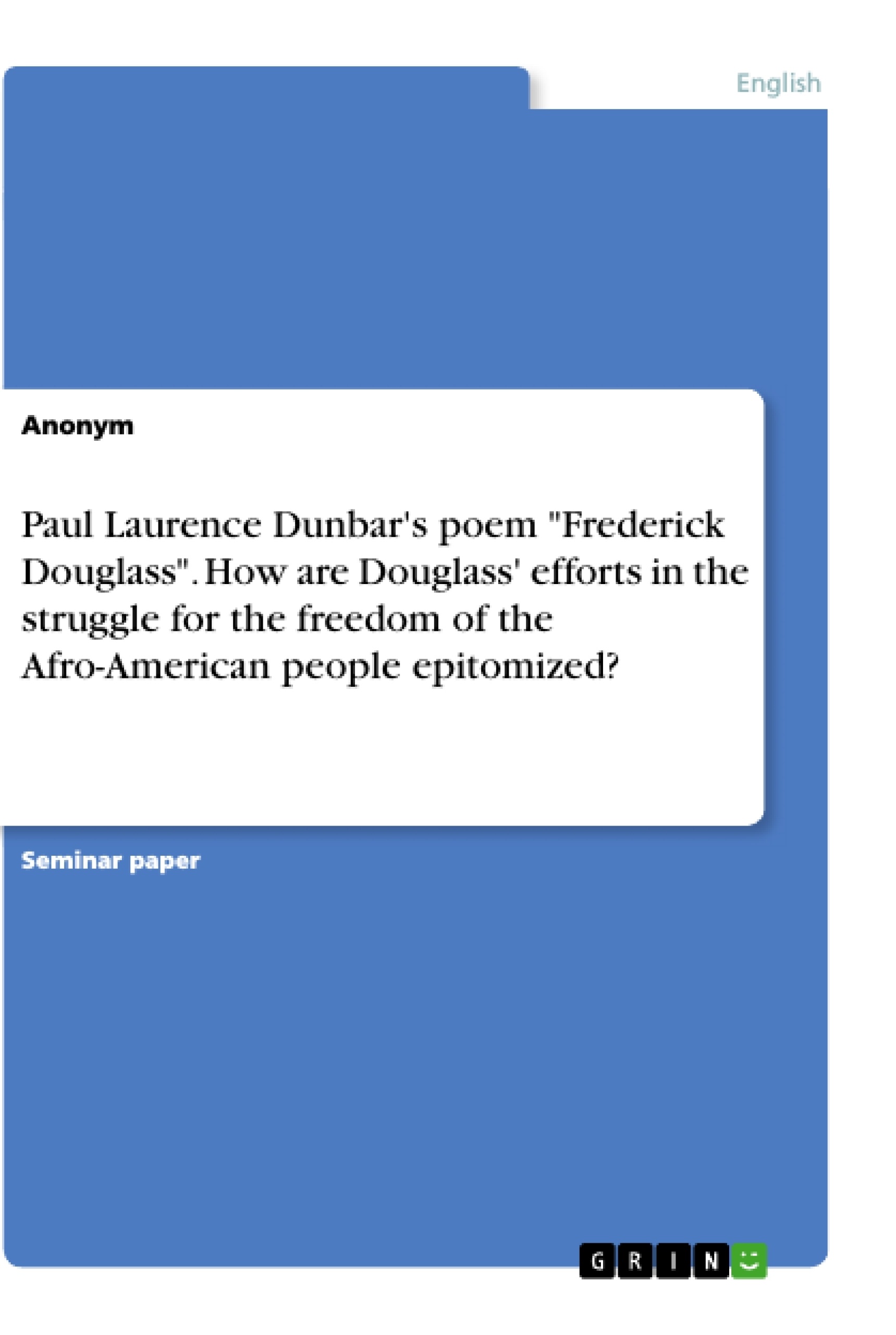The aim of this term-paper about the poem "Frederick Douglass" by Paul Laurence Dunbar is supposed to reveal that its formal features point out the ambition, Douglass displayed in his struggle to fight for the equal rights for black people. The choice to have a close look at this specific poem, was made because the two men are both of African American descent, parts of Douglass' profession resemble Dubar's, as they both were writers and the men knew each other. Furthermore, it is a tribute to Douglass and his achievements in the Abolitionist Movement. This is why this poem is of such an interest and importance.
This term-paper is composed of an objective analysis of the poem, followed by a connective part, in which the most striking formal features are linked to the relevant historical background. In the first part, the focus therefore is on examining the structure of the poem with all its stylistic and rhetorical devices. To achieve a suitable overview, this examination is done stanza by stanza. It is supposed to provide a dispassionate look on the poem. As this section only is concerned with the poem itself, there is no regard to research-literature. In the next chapter the paper then deals with the references, the poem Frederick Douglass suggests. At this point, the already disclosed formal features are reconsidered with their specific link to genuine occurrences in the life of Douglass. Therefore selected secondary literature is provided and enwrought in this chapter. This approach allows a more detailed and structured view and therefore supports the understanding of how Dunbar's poem is interwoven by the efforts, Douglass took for his race.
Table of Contents
- Introduction
- Formal features of the poem Frederick Douglass
- How specific features mirror Douglass' efforts for African American people's liberty
- Conclusion
Objectives and Key Themes
The purpose of this paper is to analyze the poem "Frederick Douglass" by Paul Laurence Dunbar and highlight how its formal features reflect the ambition Douglass displayed in his fight for the equal rights of Black people. The paper examines the poem's structure, stylistic devices, and references to Douglass's life, revealing the interconnectedness between the poem's form and Douglass's legacy.
- The poem's formal features, particularly its structure and stylistic devices, reflect Dunbar's respect and admiration for Douglass.
- The paper analyzes the poem's use of metaphors, personification, and other rhetorical devices.
- It explores the specific connections between the poem's formal features and significant events in Douglass's life.
- The paper emphasizes the importance of Douglass's efforts for African American people's liberty.
- The paper examines the poem's overall message and Dunbar's appreciation for Douglass's achievements.
Chapter Summaries
- Introduction: This chapter introduces the poem "Frederick Douglass" by Paul Laurence Dunbar and the significance of both Frederick Douglass and Paul Laurence Dunbar in the fight for African American equality. The paper outlines its objective, which is to analyze the poem's formal features and their connection to Douglass's efforts for social justice.
- Formal features of the poem Frederick Douglass: This chapter examines the poem's structure, stylistic devices, and overall form. It provides a detailed analysis of the poem, highlighting the use of antitheses, metaphors, personification, and other rhetorical devices. The chapter aims to establish a foundation for the subsequent chapter that analyzes the poem's references to Douglass's life.
Keywords
The key terms and concepts explored in this paper include the poem "Frederick Douglass," Paul Laurence Dunbar, Frederick Douglass, African American equality, formal features, stylistic devices, metaphors, personification, rhetorical devices, references to Douglass's life, and the fight for social justice.
- Quote paper
- Anonym (Author), 2016, Paul Laurence Dunbar's poem "Frederick Douglass". How are Douglass' efforts in the struggle for the freedom of the Afro-American people epitomized?, Munich, GRIN Verlag, https://www.grin.com/document/494115




